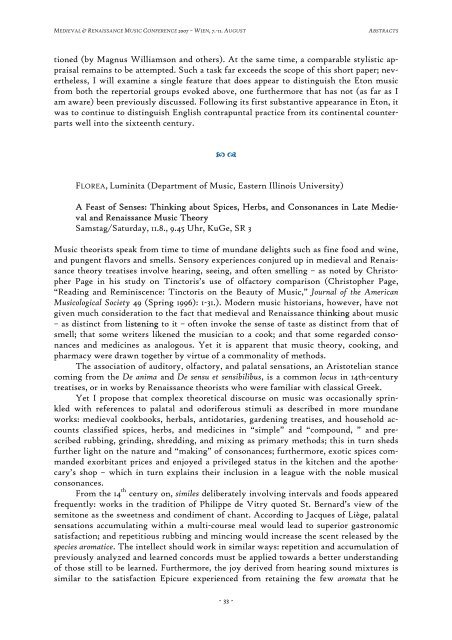(Stand: 25. Juli 2007) ANDERSON, Michael Alan ... - Universität Wien
(Stand: 25. Juli 2007) ANDERSON, Michael Alan ... - Universität Wien
(Stand: 25. Juli 2007) ANDERSON, Michael Alan ... - Universität Wien
You also want an ePaper? Increase the reach of your titles
YUMPU automatically turns print PDFs into web optimized ePapers that Google loves.
MEDIEVAL & RENAISSANCE MUSIC CONFERENCE <strong>2007</strong> – WIEN, 7.-11. AUGUST ABSTRACTS<br />
tioned (by Magnus Williamson and others). At the same time, a comparable stylistic appraisal<br />
remains to be attempted. Such a task far exceeds the scope of this short paper; nevertheless,<br />
I will examine a single feature that does appear to distinguish the Eton music<br />
from both the repertorial groups evoked above, one furthermore that has not (as far as I<br />
am aware) been previously discussed. Following its first substantive appearance in Eton, it<br />
was to continue to distinguish English contrapuntal practice from its continental counterparts<br />
well into the sixteenth century.<br />
� �<br />
FLOREA, Luminita (Department of Music, Eastern Illinois University)<br />
A Feast of Senses: Thinking about Spices, Herbs, and Consonances in Late Medieval<br />
and Renaissance Music Theory<br />
Samstag/Saturday, 11.8., 9.45 Uhr, KuGe, SR 3<br />
Music theorists speak from time to time of mundane delights such as fine food and wine,<br />
and pungent flavors and smells. Sensory experiences conjured up in medieval and Renaissance<br />
theory treatises involve hearing, seeing, and often smelling – as noted by Christopher<br />
Page in his study on Tinctoris’s use of olfactory comparison (Christopher Page,<br />
“Reading and Reminiscence: Tinctoris on the Beauty of Music,” Journal of the American<br />
Musicological Society 49 (Spring 1996): 1-31.). Modern music historians, however, have not<br />
given much consideration to the fact that medieval and Renaissance thinking about music<br />
– as distinct from listening to it – often invoke the sense of taste as distinct from that of<br />
smell; that some writers likened the musician to a cook; and that some regarded consonances<br />
and medicines as analogous. Yet it is apparent that music theory, cooking, and<br />
pharmacy were drawn together by virtue of a commonality of methods.<br />
The association of auditory, olfactory, and palatal sensations, an Aristotelian stance<br />
coming from the De anima and De sensu et sensibilibus, is a common locus in 14th-century<br />
treatises, or in works by Renaissance theorists who were familiar with classical Greek.<br />
Yet I propose that complex theoretical discourse on music was occasionally sprinkled<br />
with references to palatal and odoriferous stimuli as described in more mundane<br />
works: medieval cookbooks, herbals, antidotaries, gardening treatises, and household accounts<br />
classified spices, herbs, and medicines in “simple” and “compound, ” and prescribed<br />
rubbing, grinding, shredding, and mixing as primary methods; this in turn sheds<br />
further light on the nature and “making” of consonances; furthermore, exotic spices commanded<br />
exorbitant prices and enjoyed a privileged status in the kitchen and the apothecary’s<br />
shop – which in turn explains their inclusion in a league with the noble musical<br />
consonances.<br />
From the 14 th century on, similes deliberately involving intervals and foods appeared<br />
frequently: works in the tradition of Philippe de Vitry quoted St. Bernard’s view of the<br />
semitone as the sweetness and condiment of chant. According to Jacques of Liège, palatal<br />
sensations accumulating within a multi-course meal would lead to superior gastronomic<br />
satisfaction; and repetitious rubbing and mincing would increase the scent released by the<br />
species aromatice. The intellect should work in similar ways: repetition and accumulation of<br />
previously analyzed and learned concords must be applied towards a better understanding<br />
of those still to be learned. Furthermore, the joy derived from hearing sound mixtures is<br />
similar to the satisfaction Epicure experienced from retaining the few aromata that he<br />
- 33 -
















